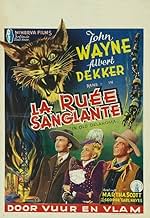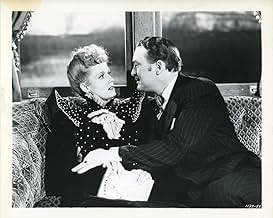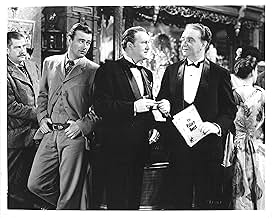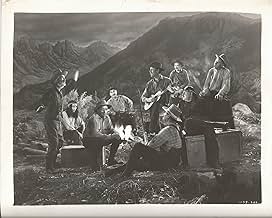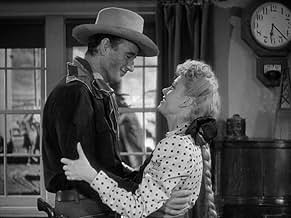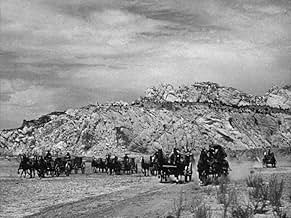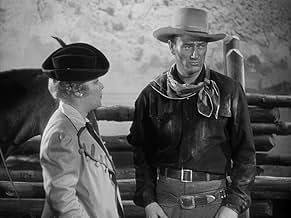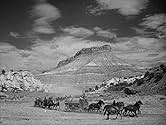IMDb RATING
6.4/10
1.7K
YOUR RATING
In 1906, on Oklahoma's Indian lands, a cowboy fights for oil lease rights against a greedy oilman while a pretty schoolteacher steals both men's hearts.In 1906, on Oklahoma's Indian lands, a cowboy fights for oil lease rights against a greedy oilman while a pretty schoolteacher steals both men's hearts.In 1906, on Oklahoma's Indian lands, a cowboy fights for oil lease rights against a greedy oilman while a pretty schoolteacher steals both men's hearts.
- Director
- Writers
- Stars
- Nominated for 2 Oscars
- 2 nominations total
Foncilla Adams
- Girl
- (uncredited)
Stanley Andrews
- Mason - Indian Agent
- (uncredited)
Charles Arnt
- Joe - Train Conductor
- (uncredited)
- Director
- Writers
- All cast & crew
- Production, box office & more at IMDbPro
6.41.7K
1
2
3
4
5
6
7
8
9
10
Featured reviews
Move Over Texaco, The Duke Is Coming
Plot-- Business tycoon Gardner wants drilling rights on Indian land and he'll use about every trick to get it. But he's up against the local little guys who've pooled their assets to get the same rights. Luckily they see in cowboy drifter Dan Somers a guy with the potential to lead them even if he doesn't see that potential himself. Plus, Dan and Gardner become rivals over the affections of winsome writer Catherine.
That climatic wagon stampede across the flat prairie still has me dizzy. Great action effect that must have employed every stuntman in Hollywood, to say nothing about every wagon. Now, if Dan (Wayne) doesn't get to the government office first, then the scheming Gardner (Dekker) gets the oil millions. Okay, so Dan's got an edge since the government man likes the ladies more than his duties. But, what great rivals Wayne and Dekker make. Each is an imposing presence, even if Wayne puts on his best "aw shucks" act, while Dekker keeps an icy calm. And I love it when they duel gimlet-eye to gimlet-eye. Still, sweet-face Martha Scott gets as much screen time as the guys, so likely Republic was trying to build her into a star. And, of course, where there's Wayne, Gabby Hayes can't be far behind, doing his unforgettable crusty old coot bit. And catch the pre-Roy Dale Evans bringing down the house with as charming a stage number as many an A-musical. No wonder Roy grabbed her.
All in all, it's a spectacular action flick, even if the romantic interludes get a little tiresome. Wayne sure shows his acting chops, more animated than I've seen him. His cowboy Dan goes from just another prairie drifter to hard-driving trail boss in really convincing fashion. And though he'd probably hate the word, he does it in what amounts to winning fashion. And catch that opening sequence in Gardner's private car. It's unusual and superbly done. Republic popped a bundle for this, and it shows up in the colorful crowd scenes (thanks to director Rogell) and big oil well gushers, along with that final stampede.
I'm not sure why this unusual oater is so obscure in the Wayne canon. But in my book it's as good entertainment as any of his many horse operas. And for fans of crashing buckboards, this is the Promised Land.
That climatic wagon stampede across the flat prairie still has me dizzy. Great action effect that must have employed every stuntman in Hollywood, to say nothing about every wagon. Now, if Dan (Wayne) doesn't get to the government office first, then the scheming Gardner (Dekker) gets the oil millions. Okay, so Dan's got an edge since the government man likes the ladies more than his duties. But, what great rivals Wayne and Dekker make. Each is an imposing presence, even if Wayne puts on his best "aw shucks" act, while Dekker keeps an icy calm. And I love it when they duel gimlet-eye to gimlet-eye. Still, sweet-face Martha Scott gets as much screen time as the guys, so likely Republic was trying to build her into a star. And, of course, where there's Wayne, Gabby Hayes can't be far behind, doing his unforgettable crusty old coot bit. And catch the pre-Roy Dale Evans bringing down the house with as charming a stage number as many an A-musical. No wonder Roy grabbed her.
All in all, it's a spectacular action flick, even if the romantic interludes get a little tiresome. Wayne sure shows his acting chops, more animated than I've seen him. His cowboy Dan goes from just another prairie drifter to hard-driving trail boss in really convincing fashion. And though he'd probably hate the word, he does it in what amounts to winning fashion. And catch that opening sequence in Gardner's private car. It's unusual and superbly done. Republic popped a bundle for this, and it shows up in the colorful crowd scenes (thanks to director Rogell) and big oil well gushers, along with that final stampede.
I'm not sure why this unusual oater is so obscure in the Wayne canon. But in my book it's as good entertainment as any of his many horse operas. And for fans of crashing buckboards, this is the Promised Land.
Gem of a John Wayne Film
This a John Wayne film like no other. Take it from a huge fan that's seen most of his movies. Although this not classified as a comedy, the Duke's turns in a sly performance full of great one-liners and facial expressions that had me rolling. Its action adventure in the oil fields and it's very entertaining and fun. Wayne is Cowboy Dan Somers and he competes with oilman Jim Gardner for oil lease rights on Indian land in Oklahoma, as well as for the attentions of schoolteacher turned scandalous book author Cathy Allen. It has a good supporting cast including George "Gabby" Hayes. You will never see the Duke quite like this in any other role. If you're a fan of the Duke, you will love this film. It was originally titled "In Old Oklahoma" and then reissued as "War of the Wildcats".
Solid entertainment, if a bit formulaic
This was Republic's most successful picture of 1943, offering solid if unspectacular entertainment.
It is a somewhat unusual western, being set in the early 20th century and featuring an antagonist (played by Albert Dekker) who is a ruthless businessman rather than the conventional evil villain. Dekker represents modernity and Wayne, of course, the more traditional hard moral man.
The two male leads compete for the heart of a romance writer played by Martha Scott, and for the oil rights of the Indian territory, with Wayne representing a much less predatory way of doing business.
Add some humor and lively action scenes and you get a quite enjoyable product, if a bit formulaic.
It is a somewhat unusual western, being set in the early 20th century and featuring an antagonist (played by Albert Dekker) who is a ruthless businessman rather than the conventional evil villain. Dekker represents modernity and Wayne, of course, the more traditional hard moral man.
The two male leads compete for the heart of a romance writer played by Martha Scott, and for the oil rights of the Indian territory, with Wayne representing a much less predatory way of doing business.
Add some humor and lively action scenes and you get a quite enjoyable product, if a bit formulaic.
better than your average western
In imdb, it's In old oklahoma.... roku has this as war of the wildcats 1943; the opening credits show wildcats. Stars john wayne, al dekker. When school teacher catherine allen heads west to really experience life, she bumps smack into wildcat oilman jim gardner and cowboy dan somers. Of course, they both chase after her. As well as oil rights. And what kind of a western would this be without gabby hayes? And dale evans in one of her earlier roles. It's silly and fun and moves right along. Better than your average western. Not dry and dusty like so many others. Directed by albert rogell. Nominated for best music and best sound.
Fairly ordinary western with some interesting moments.
One of Poverty Row studio Republic's intermittent big-budget efforts, War of the Wildcats is a lively, if fairly routine, western notable for its early 20th-century setting. Wayne plays Daniel F. Somers, formerly one of Teddy Roosevelt's rough riders, who finds himself entangled in a love-and-oil battle with Albert Dekker. Wayne is fairly amiable here, representing the old west and the little man forced to adapt in the face of modern technology and the dawn of big business. Dekker, of course, represents this future. He drives one of them new-fangled auto-mobeels and is erecting oil wells just as fast as he can. He is also dismissive of the native population he even has one, a Cherokee, scrub his back as he takes a bath while Wayne shows them respect and receives it in return. I'm not quite sure how that stacks up today, given our knowledge that the treatment of the native American by the old west fell somewhat short of what can be considered fair.
Anyway, possibly the best aspect of this film is that Dekker's character isn't portrayed as an out-and-out villain, driven only by greed. He is smart and relatively sophisticated, and also brave. Anyone who has ever had the experience of working with or for a 'captain of industry' (for want of a better term) or a self-made man, will probably recognise oilman Gardner's characteristics exactly as those that account for the success of these people. They aren't necessarily bad people, just ruthless enough to do whatever is necessary in pursuit of their goals.
Martha Scott is a fairly bland heroine it's difficult to see why such rugged individuals as Somers and Gardner would both be so keen to bed her. Gardner's frankness in this matter is also refreshing given the times in which this film was made. He makes no secret of what he desires from Catherine and doesn't resort to any particular underhand tactics to make his desires come true. Of course, he doesn't succeed it would be another quarter of a century before Hollywood would allow a character like Jim Gardiner to win the girl (and the oil).
Anyway, possibly the best aspect of this film is that Dekker's character isn't portrayed as an out-and-out villain, driven only by greed. He is smart and relatively sophisticated, and also brave. Anyone who has ever had the experience of working with or for a 'captain of industry' (for want of a better term) or a self-made man, will probably recognise oilman Gardner's characteristics exactly as those that account for the success of these people. They aren't necessarily bad people, just ruthless enough to do whatever is necessary in pursuit of their goals.
Martha Scott is a fairly bland heroine it's difficult to see why such rugged individuals as Somers and Gardner would both be so keen to bed her. Gardner's frankness in this matter is also refreshing given the times in which this film was made. He makes no secret of what he desires from Catherine and doesn't resort to any particular underhand tactics to make his desires come true. Of course, he doesn't succeed it would be another quarter of a century before Hollywood would allow a character like Jim Gardiner to win the girl (and the oil).
Did you know
- TriviaSidney Blackmer made a career out of playing Teddy Roosevelt. He played him eight times in various film projects. 1-"This Is My Affair" (1937) 2-"The Monroe Doctrine" (1939) 3-"Teddy the Rough Rider" (1940) 4-"March On, America!" (1942) 5-"In Old Oklahoma" (1943), 6-"Bill "Buffalo Bill" (1944) 7-"My Girl Tisa" (1948) 8-"Never Kick a Man Upstairs" (TV Movie) (1953).
- Quotes
Bessie Baxter: We've got a long way to go, and a short time to get there.
- ConnectionsEdited into Six Gun Theater: In Old Oklahoma (2021)
- How long is In Old Oklahoma?Powered by Alexa
Details
- Release date
- Country of origin
- Language
- Also known as
- Cuando una mujer se atreve
- Filming locations
- Production company
- See more company credits at IMDbPro
- Runtime
- 1h 42m(102 min)
- Color
- Aspect ratio
- 1.37 : 1
Contribute to this page
Suggest an edit or add missing content

